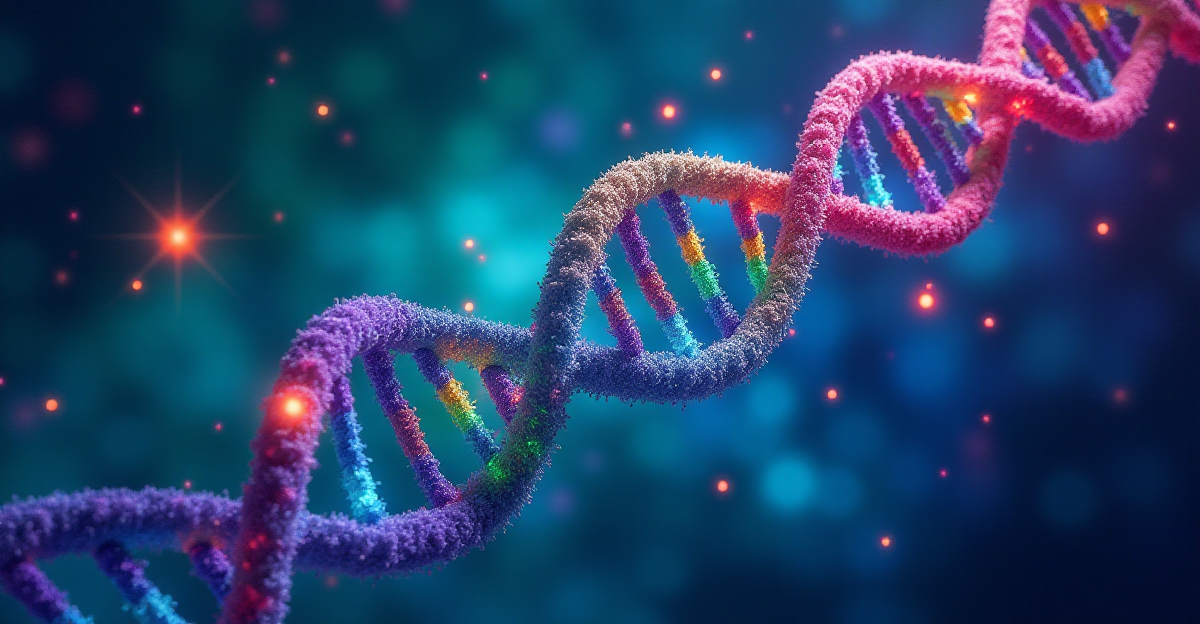Epigenetics investigates how our environment and actions could produce changes that influence the functioning of our genes without changing the DNA sequence itself. This essay walks you through actual cases where stress, nutrition, and exercise clearly affect family health histories—not through genetics but rather through epigenetics. We will go over studies demonstrating through epigenetic markings how maternal diet during pregnancy can routinely change the health outcomes of offspring. The paper offers a close-up view of how we might affect our genetic manifestations by describing a personal trip of adopting lifestyle adjustments to maybe change my own epigenetic profile. This investigation of epigenetics starts conversations on our obligations to next generations.
Table of Contents
- Understanding Epigenetics
- Lifestyle Choices and How Our Genes Work
- The Future of Epigenetic Therapies
- Extra’s:
Understanding Epigenetics

Have you ever considered how your lifestyle choices can affect your genes? Investigating this intriguing subject, the discipline of epigenetics shows that our daily choices can affect gene expression without changing the basic DNA sequence. See your DNA as a huge library with all of your genetic data. Like a librarian, epigenetics carefully places notes and bookmarks within these books to identify which areas are accessed and how knowledge is interpreted. Basically, your DNA is set, but depending on your experiences and surroundings, the way your genes work can vary all your life.
The Impact of Lifestyle on Gene Expression
One of the most fascinating features of epigenetics is the great impact of our daily behavior on gene expression. It may surprise you to find that diet, exercise, and stress management can be strong epigenetic regulators, therefore influencing your health and well-being. We seem to have a customized guidebook for maximizing our genetic blueprint, which would enable us to maybe control gene activity and enhance our general condition. Thus, by choosing our lifestyle, we can affect not only our own but also the health legacy we leave for next generations.
Practical Tips for a Healthier Lifestyle
Let’s explore some doable suggestions for including lifestyle epigenetics into your everyday schedule:
- Nutrition: A balanced diet rich in fruits, vegetables, and whole grains provides essential nutrients that support healthy gene expression. Prioritize foods rich in antioxidants, such as berries and leafy greens, while limiting processed foods, sugary drinks, and unhealthy fats.
- Exercise: Regular physical activity has been shown to positively impact gene expression, promoting healthy aging and reducing the risk of chronic diseases. Aim for at least 150 minutes of moderate-intensity exercise or 75 minutes of vigorous-intensity exercise per week.
- Stress Management: Chronic stress can negatively impact gene activity and contribute to various health problems. Implement stress-reducing techniques into your routine, such as meditation, deep breathing exercises, or yoga. Prioritize sleep, ensuring you get 7-8 hours of quality sleep each night.
Epigenetics: A New Frontier in Healthcare
Though still in its early years, epigenetics has great potential to transform medicine. Knowing how our surroundings affect our DNA helps us create individualized plans for early diagnosis, disease prevention, and focused treatments. The understanding of epigenetics helps us to take charge of our health and maybe affect the condition of next generations. Knowing that we significantly affect the well-being of those who come after us and that of ourselves pushes us to give a healthy lifestyle first priority.
Incorporating lifestyle epigenetics ideas into our daily existence can help us to realize the possibilities of our genes and lead a better life. Let’s welcome the powerful information that will help us to improve our own and the condition of those we love. Discover more about epigenetics and how you might right now take charge of your health!
Lifestyle Choices and How Our Genes Work

Have you ever thought about whether your everyday routines could really affect the functioning of your genes? Right? That’s a mind-boggling concept. This is where epigenetics enters the picture: the study of how our “lifestyle and environmental factors” might affect how our genes function without changing the basic DNA sequence. See your DNA as a vast cookbook with all of your hereditary recipes. Epigenetics chooses which recipes to utilize and how to cook them, much as a chef. The ingredients you use and how you prepare them will greatly affect the food you produce even if the guidebook stays the same. This means that depending on your experiences and “lifestyle and environmental factors,” the way your genes operate can vary throughout your life even while your DNA is fixed.
How Lifestyle Impacts How Our Genes Work
The way our genes function is much shaped by our lifestyle. This implies that our daily activities—that is, what we eat, how much we exercise, and how we handle stress—can all affect our genes and hence affect our health and well-being. We are not limited to our natural DNA. Our personal health can be shaped and our genes’ functioning actively under our control. Our lifestyle decisions can also affect the health we pass on to our children.
Researchers have found, for instance, that offspring of those who went through starvation during pregnancy could be more likely to have several chronic diseases including diabetes, heart disease, or cancer later on. This is so because mutations in the parents’ genes brought about by the famine environment were passed on to their offspring. Still another illustration is how smoking increases lung cancer risk. Because of the “lifestyle and environmental factors” connected with smoking, smokers are far more prone than non-smoking people to acquire lung cancer.
Practical Tips for Modifying How Your Genes Work
Here are some doable ideas for adding healthy lifestyle adjustments into your everyday schedule:
- What to Eat: Eating a healthy diet full of fruits, vegetables, and whole grains can help your body stay healthy. Focus on foods that are high in antioxidants, like berries and leafy greens, and try to avoid processed foods, sugary drinks, and unhealthy fats.
- Get Moving: Regular exercise is great for your genes! It can help you age healthily and reduce your risk of getting chronic diseases such as diabetes, heart disease, or cancer. Aim for at least 150 minutes of moderate-intensity exercise or 75 minutes of vigorous-intensity exercise per week. I personally found that incorporating more walks into my daily routine has had a positive impact on my overall health and well-being.
- Manage Stress: Chronic stress can be tough on your genes and can even lead to health problems. Make time for stress-reducing activities like meditation, deep breathing exercises, or yoga. And don’t forget to prioritize sleep! Aim for 7-8 hours of quality sleep every night.
Epigenetics offers a strong instrument for personal emancipation. Understanding how our decisions may affect the functioning of our genes helps us to make wise decisions regarding our lifestyle and might help us to be healthier. Start implementing these healthy lifestyle adjustments right now and observe how much better your health—and maybe even the health of your future children—may be!
The Future of Epigenetic Therapies

Have you ever considered how your choices of behavior might really affect your genes? It’s not only about the DNA you pick up from your parents. The intriguing discipline of epigenetics investigates how environmental events could turn genes on or off, therefore influencing our health and well-being. It’s about realizing how our surroundings—including our food, stress level, even the air we breathe—may change the expression of our genes.
Epigenetic Therapies: A New Frontier in Medicine
Imagine a time when wise lifestyle decisions will help you to control your health. A new front in medicine, epigenetic therapies are bringing this prospect to pass. These treatments target not the DNA sequence itself. Rather, they concentrate on changing the epigenetic switches in charge of reading genes into proteins. Imagine these switches, as light switches able to turn genes on or off. Attaching to DNA and able to influence gene expression, they are chemical tags known as methyl groups. Targeting these switches, scientists could be able to treat diseases in fresh and creative ways.
The Environmental Impact on Epigenetics
Expression of our genes depends much on the surroundings. See it as our genes’ ongoing conversation with the environment in which we live. Our epigenetic control can be influenced by anything we consume, including poisons as well as nourishment. A diet high in fruits and vegetables, for instance, has been related to favorable epigenetic modifications; air pollution can have deleterious impacts on gene expression. Let’s explore some particular instances further.
- Diet: Studies have shown that a diet rich in fruits, vegetables, and whole grains can have a positive impact on hereditary health by promoting healthy epigenetic changes. For example, a study published in the journal Cancer Research found that a diet high in fruits and vegetables was associated with a lower risk of developing certain types of cancer.
- Stress: Chronic stress can have a negative impact on our epigenetic landscape. Studies have shown that stress can lead to changes in gene expression that increase the risk of developing chronic diseases such as heart disease, diabetes, and depression.
- Pollution: Exposure to air pollution has been linked to epigenetic changes that can increase the risk of developing respiratory diseases, cardiovascular disease, and even cancer.
Promising Applications of Epigenetic Therapies
Epigenetic treatments have rather amazing potential. Their application in several spheres of medicine is under intensive investigation by scientists.
- Cancer Treatment: Epigenetic therapies for cancer focus on reversing the epigenetic changes that allow cancer cells to grow uncontrollably. One promising approach involves using drugs that inhibit enzymes responsible for adding methyl groups to DNA. This process can silence tumor suppressor genes, which are crucial for controlling cell growth.
- Neurological Disorders: These therapies hold promise for treating neurodegenerative diseases like Alzheimer’s and Parkinson’s. They aim to restore the balance of gene expression in the brain, promoting neuronal function and protecting against cell death.
- Mental Health Conditions: The role of epigenetic modifications in mental health is becoming increasingly clear. Epigenetic therapies might offer new avenues for treating depression, anxiety, and schizophrenia by targeting the epigenetic changes that contribute to these disorders.
Embracing the Future of Epigenetic Therapies
There are many opportunities ahead for epigenetics, and its effects on human health seem to be revolutionary. Imagine a time when lifestyle choices will allow us to maximize our health and prevent diseases. Understanding the ideas of epigenetics and the possibilities of epigenetic interventions helps us to empower ourselves to make wise decisions for our health and well-being. See reliable sites like the American Cancer Society or the National Institutes of Health (NIH) to learn more about epigenetics and how to make lifestyle decisions that favor good gene expression. Participating actively in our hereditary health will help us to open the path for a better future.
Extra’s:
For those interested in the impact of environmental factors on our planet, “How Photosynthesis Could Help Fight Climate Change” delves into the potential of harnessing nature’s own processes to combat climate change. And for a deeper dive into the intricate relationship between humans and animals, “Zoonotic Diseases: How Animal Infections Can Jump to Humans” explores the emerging threat of zoonotic diseases and their implications for public health.
To learn more about the fascinating interplay between lifestyle and epigenetics, “Epigenetics and lifestyle – PMC” provides a comprehensive overview of this field. For a detailed look at the impact of specific environmental factors on our epigenetic age, “Stress, diet, exercise: Common environmental factors and their impact on epigenetic age – ScienceDirect” offers valuable insights into how our daily choices can shape our genetic destiny.












1 thought on “How Your Lifestyle Shapes Your Genes: The Epigenetics Revolution”